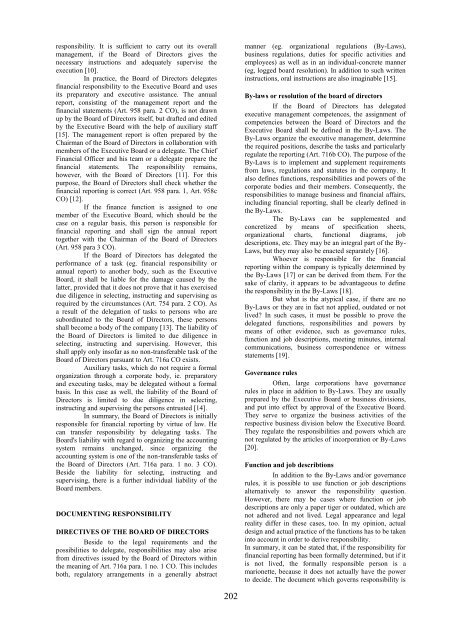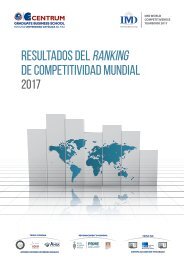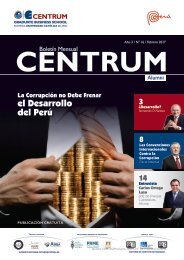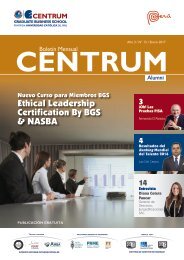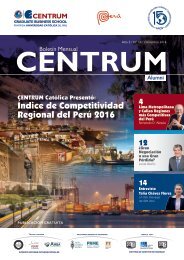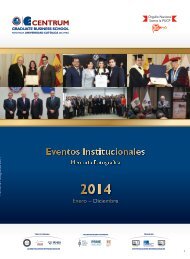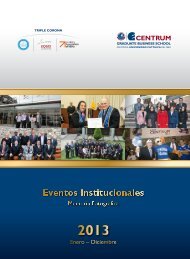Pan-Pacific Conference XXXIV. Designing New Business Models in Developing Economies
This publication represents the Proceedings of the 34th Annual Pan-Pacific Conference being held in Lima, Peru May 29-31, 2017. The Pan-Pacific Conference has served as an important forum for the exchange of ideas and information for promoting understanding and cooperation among the peoples of the world since 1984. Last year, we had a memorable conference in Miri, Malaysia, in cooperation with Curtin University Sarawak, under the theme of “Building a Smart Society through Innovation and Co-creation.” Professor Pauline Ho served as Chair of the Local Organizing Committee, with strong leadership support of Pro Vice-Chancellor Professor Jim Mienczakowski and Dean Jonathan Winterton.
This publication represents the Proceedings of the 34th Annual Pan-Pacific Conference being held in Lima, Peru May 29-31, 2017. The Pan-Pacific Conference has served as an important forum for the exchange of ideas and information for promoting understanding and cooperation among the peoples of the world since 1984. Last year, we had a memorable conference in Miri, Malaysia, in cooperation with Curtin University Sarawak, under the theme of “Building a Smart Society through Innovation and Co-creation.” Professor Pauline Ho served as Chair of the Local Organizing Committee, with strong leadership support of Pro Vice-Chancellor Professor Jim Mienczakowski and Dean Jonathan Winterton.
You also want an ePaper? Increase the reach of your titles
YUMPU automatically turns print PDFs into web optimized ePapers that Google loves.
esponsibility. It is sufficient to carry out its overall<br />
management, if the Board of Directors gives the<br />
necessary <strong>in</strong>structions and adequately supervise the<br />
execution [10].<br />
In practice, the Board of Directors delegates<br />
f<strong>in</strong>ancial responsibility to the Executive Board and uses<br />
its preparatory and executive assistance. The annual<br />
report, consist<strong>in</strong>g of the management report and the<br />
f<strong>in</strong>ancial statements (Art. 958 para. 2 CO), is not drawn<br />
up by the Board of Directors itself, but drafted and edited<br />
by the Executive Board with the help of auxiliary staff<br />
[15]. The management report is often prepared by the<br />
Chairman of the Board of Directors <strong>in</strong> collaboration with<br />
members of the Executive Board or a delegate. The Chief<br />
F<strong>in</strong>ancial Officer and his team or a delegate prepare the<br />
f<strong>in</strong>ancial statements. The responsibility rema<strong>in</strong>s,<br />
however, with the Board of Directors [11]. For this<br />
purpose, the Board of Directors shall check whether the<br />
f<strong>in</strong>ancial report<strong>in</strong>g is correct (Art. 958 para. 1, Art. 958c<br />
CO) [12].<br />
If the f<strong>in</strong>ance function is assigned to one<br />
member of the Executive Board, which should be the<br />
case on a regular basis, this person is responsible for<br />
f<strong>in</strong>ancial report<strong>in</strong>g and shall sign the annual report<br />
together with the Chairman of the Board of Directors<br />
(Art. 958 para 3 CO).<br />
If the Board of Directors has delegated the<br />
performance of a task (eg. f<strong>in</strong>ancial responsibility or<br />
annual report) to another body, such as the Executive<br />
Board, it shall be liable for the damage caused by the<br />
latter, provided that it does not prove that it has exercised<br />
due diligence <strong>in</strong> select<strong>in</strong>g, <strong>in</strong>struct<strong>in</strong>g and supervis<strong>in</strong>g as<br />
required by the circumstances (Art. 754 para. 2 CO). As<br />
a result of the delegation of tasks to persons who are<br />
subord<strong>in</strong>ated to the Board of Directors, these persons<br />
shall become a body of the company [13]. The liability of<br />
the Board of Directors is limited to due diligence <strong>in</strong><br />
select<strong>in</strong>g, <strong>in</strong>struct<strong>in</strong>g and supervis<strong>in</strong>g. However, this<br />
shall apply only <strong>in</strong>sofar as no non-transferable task of the<br />
Board of Directors pursuant to Art. 716a CO exists.<br />
Auxiliary tasks, which do not require a formal<br />
organization through a corporate body, ie. preparatory<br />
and execut<strong>in</strong>g tasks, may be delegated without a formal<br />
basis. In this case as well, the liability of the Board of<br />
Directors is limited to due diligence <strong>in</strong> select<strong>in</strong>g,<br />
<strong>in</strong>struct<strong>in</strong>g and supervis<strong>in</strong>g the persons entrusted [14].<br />
In summary, the Board of Directors is <strong>in</strong>itially<br />
responsible for f<strong>in</strong>ancial report<strong>in</strong>g by virtue of law. He<br />
can transfer responsibility by delegat<strong>in</strong>g tasks. The<br />
Board's liability with regard to organiz<strong>in</strong>g the account<strong>in</strong>g<br />
system rema<strong>in</strong>s unchanged, s<strong>in</strong>ce organiz<strong>in</strong>g the<br />
account<strong>in</strong>g system is one of the non-transferable tasks of<br />
the Board of Directors (Art. 716a para. 1 no. 3 CO).<br />
Beside the liability for select<strong>in</strong>g, <strong>in</strong>struct<strong>in</strong>g and<br />
supervis<strong>in</strong>g, there is a further <strong>in</strong>dividual liability of the<br />
Board members.<br />
DOCUMENTING RESPONSIBILITY<br />
DIRECTIVES OF THE BOARD OF DIRECTORS<br />
Beside to the legal requirements and the<br />
possibilities to delegate, responsibilities may also arise<br />
from directives issued by the Board of Directors with<strong>in</strong><br />
the mean<strong>in</strong>g of Art. 716a para. 1 no. 1 CO. This <strong>in</strong>cludes<br />
both, regulatory arrangements <strong>in</strong> a generally abstract<br />
manner (eg. organizational regulations (By-Laws),<br />
bus<strong>in</strong>ess regulations, duties for specific activities and<br />
employees) as well as <strong>in</strong> an <strong>in</strong>dividual-concrete manner<br />
(eg, logged board resolution). In addition to such written<br />
<strong>in</strong>structions, oral <strong>in</strong>structions are also imag<strong>in</strong>able [15].<br />
By-laws or resolution of the board of directors<br />
If the Board of Directors has delegated<br />
executive management competences, the assignment of<br />
competencies between the Board of Directors and the<br />
Executive Board shall be def<strong>in</strong>ed <strong>in</strong> the By-Laws. The<br />
By-Laws organize the executive management, determ<strong>in</strong>e<br />
the required positions, describe the tasks and particularly<br />
regulate the report<strong>in</strong>g (Art. 716b CO). The purpose of the<br />
By-Laws is to implement and supplement requirements<br />
from laws, regulations and statutes <strong>in</strong> the company. It<br />
also def<strong>in</strong>es functions, responsibilities and powers of the<br />
corporate bodies and their members. Consequently, the<br />
responsibilities to manage bus<strong>in</strong>ess and f<strong>in</strong>ancial affairs,<br />
<strong>in</strong>clud<strong>in</strong>g f<strong>in</strong>ancial report<strong>in</strong>g, shall be clearly def<strong>in</strong>ed <strong>in</strong><br />
the By-Laws.<br />
The By-Laws can be supplemented and<br />
concretized by means of specification sheets,<br />
organizational charts, functional diagrams, job<br />
descriptions, etc. They may be an <strong>in</strong>tegral part of the By-<br />
Laws, but they may also be enacted separately [16].<br />
Whoever is responsible for the f<strong>in</strong>ancial<br />
report<strong>in</strong>g with<strong>in</strong> the company is typically determ<strong>in</strong>ed by<br />
the By-Laws [17] or can be derived from them. For the<br />
sake of clarity, it appears to be advantageous to def<strong>in</strong>e<br />
the responsibility <strong>in</strong> the By-Laws [18].<br />
But what is the atypical case, if there are no<br />
By-Laws or they are <strong>in</strong> fact not applied, outdated or not<br />
lived? In such cases, it must be possible to prove the<br />
delegated functions, responsibilities and powers by<br />
means of other evidence, such as governance rules,<br />
function and job descriptions, meet<strong>in</strong>g m<strong>in</strong>utes, <strong>in</strong>ternal<br />
communications, bus<strong>in</strong>ess correspondence or witness<br />
statements [19].<br />
Governance rules<br />
Often, large corporations have governance<br />
rules <strong>in</strong> place <strong>in</strong> addition to By-Laws. They are usually<br />
prepared by the Executive Board or bus<strong>in</strong>ess divisions,<br />
and put <strong>in</strong>to effect by approval of the Executive Board.<br />
They serve to organize the bus<strong>in</strong>ess activities of the<br />
respective bus<strong>in</strong>ess division below the Executive Board.<br />
They regulate the responsibilities and powers which are<br />
not regulated by the articles of <strong>in</strong>corporation or By-Laws<br />
[20].<br />
Function and job describtions<br />
In addition to the By-Laws and/or governance<br />
rules, it is possible to use function or job descriptions<br />
alternatively to answer the responsibility question.<br />
However, there may be cases where function or job<br />
descriptions are only a paper tiger or outdated, which are<br />
not adhered and not lived. Legal appearance and legal<br />
reality differ <strong>in</strong> these cases, too. In my op<strong>in</strong>ion, actual<br />
design and actual practice of the functions has to be taken<br />
<strong>in</strong>to account <strong>in</strong> order to derive responsibility.<br />
In summary, it can be stated that, if the responsibility for<br />
f<strong>in</strong>ancial report<strong>in</strong>g has been formally determ<strong>in</strong>ed, but if it<br />
is not lived, the formally responsible person is a<br />
marionette, because it does not actually have the power<br />
to decide. The document which governs responsibility is<br />
202


